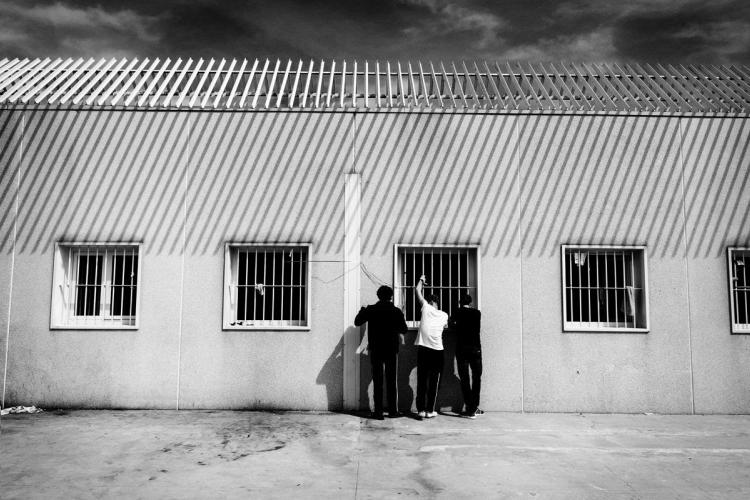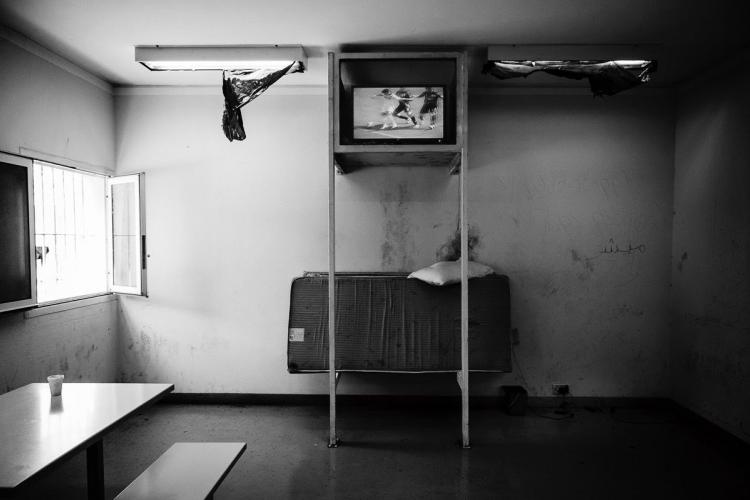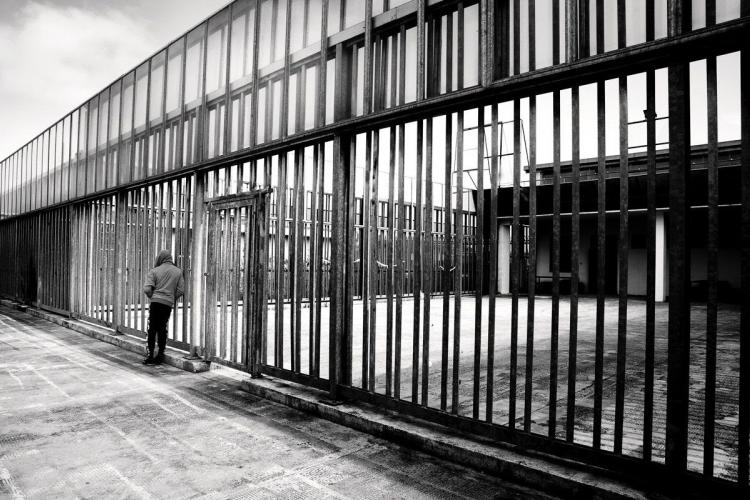“Black Holes”: Detention Without Charge and Violations of Human Rights in Italian Detention Centres
Experiences from the field: This new section on our blog is dedicated to the experiences of those on the ground, activists, community advocates and experts-by-experience. This new ongoing series has been organised by Francesca Esposito and Andriani Fili, as part of their continuing work in expanding the connections between Border Criminologies and community engagement and activism, and in using the Border Criminologies platform to amplify the voices and experiences of those at the forefront of struggles against border violence. These voices, and the meaningful insights they provide, are in fact often overlooked in mainstream academic discourses. This ongoing series attempts to fill this gap. Do get in touch with us if you want to contribute.
Posted:
Time to read:
Post by Marianna Marzano. Marianna is a graduate in Law with a specialization in human rights at Sant'Anna School of Advanced Studies and currently an intern at the legal department of Coalizione Italiana Libertà e Diritti Civili (CILD). Founded in 2014, the Italian Coalition for Civil Liberties and Rights (Coalizione Italiana per le Libertà e i Diritti Civili, CILD) is a network of 41 civil society organizations. CILD aims to defend and promote civil liberties and rights guaranteed by the Italian Constitution and by international law, and to fight civil rights abuses and violations through advocacy, public education and legal action.
“Black Holes: detention without charge in Repatriation Centers for Migrants - Centri di Permanenza per i Rimpatri (CPRs)” is the first report on Italian detention centres produced by CILD (Italian Coalition for Civil Liberties and Rights - Coalizione Italiana Libertà e Diritti Civili). The report offers an extensive analysis of the conditions inside the ten Italian CPRs, Milano, Torino, Gradisca d’Isonzo, Roma, Palazzo San Gervasio, Macomer, Brindisi-Restinco, Bari-Palese, Trapani Milo, Caltanissetta-Pian del Lago, where fundamental rights such as the right to health, right to information and defense are either neglected or completely denied. In these centers people are deprived of their freedom for months on end despite not having committed any crime and without the guarantees offered by the criminal justice system.
Immigration detention in Italian CPRs: the anatomy of a failure
The aim of the report is to shed light on the heavy shadows over immigration detention in Italy. The methodology used combines quantitative and qualitative methods of analysis, using different tools like questionnaires, FOIA (Freedom of Information Act), and interviews with key stakeholders. Decree Law No. n.13/2017 has designed a new immigration detention system in Italy, establishing the creation of one detention centre (Centro di Permanenza per i Rimpatri-CPR) in each Italian region. The report addresses important issues, such as the costs incurred for running these facilities, their management and maintenance, as well as the living conditions for the detained population.

Between 2018 and 2021, 44 million euros have been spent for the management of Italian detention facilities. Adding costs for the maintenance of facilities and police staff, raise the average daily expenditure to 40,150 euros to detain less than 400 people per day. Yet, national expenditures have to be evaluated through the lens of the immigration detention system’s effectiveness, i.e., its ability to satisfy its primary objective, which is detainees’ effective repatriation. As the report denounces, in 50% of cases, people are deprived of their freedom without any possibility of actually being repatriated to their country of origin. Therefore, we argue, detention has essentially a symbolic nature, punishing individuals who have not committed a crime but who are "guilty" of being irregular.
The private management of CPRs and the consequences on healthcare
Italian CPRs are managed by private entities, which creates an overriding financial interest based on the maximization of profits, rendering the needs of those detained insignificant. As it is highlighted in the report, detention conditions do not meet the standards established by the European Committee for the Prevention of Torture. The entities involved in their management consist of social cooperatives and cultural associations, but also international corporations which operate in the area of migrant detention or prison services across Europe. For example, the CPR of Macomer (in Sardinia) is managed by Ors Italia, a company based in Zurich that manages immigration detention centres in four European countries (e.g. read the report by Amnesty International on the inhuman conditions inside the Traiskirchen detention centre in Austria).
Even though several provisions exist, especially CIE Regulations, stating that there should be a cooperation protocol between detention healthcare services and the national health system, healthcare is usually provided by private entities, not without consequences. The most serious problems include the lack or the inadequacy of the assessment of whether or not people are fit for detention, the lack of "observation rooms" for people experiencing physical and mental health problems and in need of continuous monitoring by medical staff, the use of illegitimate practices of isolation, the lack of psychological support and abuse in the administration of psychotropic drugs and anxiolytics.

The report indeed highlights that in many cases undocumented migrants find themselves in CPRs, despite not being suitable for detention. A notable example is that of Moussa Balde, a 23-year-old Guinean young man, who was first violently beaten in Ventimiglia and then taken to the CPR of Turin where he then committed suicide. His critical psycho-physical condition should have been a clear indicator of his unsuitability for detention. Furthermore, the issue of abuse in administering psychiatric drugs by private facility management companies is a highly problematic aspect. For instance, in the CPR of Milan, according to the testimony of the managing body, the overall misuse of prescribing psychotropics reaches 80%. The situation is made worse by the lack of connection with the local ASLs (Aziende Sanitarie Locali - public companies which provide health services), leading to the total absence of adequate psychiatric assistance. These practices could potentially bring about serious violations of the right to health and increase the risk of critical events such as self-harm, fights, fires, riots, damage, suicides and deaths.
The number of deaths in CPRs, as highlighted in the report, has never been as high as in recent years. Between June 2019 and July 2021, in addition to Moussa Balde, five other foreign citizens lost their lives, mainly due to their needs being neglected. E.H., a 20-year-old Nigerian boy, committed suicide in the CPR of Brindisi on June 2, 2019. Although the Bolzano mental health center had confirmed his psychological instability at the time, he was considered suitable for detention. Hossain Faisal, a 32-year-old Bengali man, died in the CPR hospital in Turin on July 8, 2019, allegedly due to a heart attack. He too was considered suitable for detention, despite his precarious health conditions. Aymen Mekni, a 34-year-old Tunisian man, died, due to sudden illness, in the CPR of Caltanissetta on January 12, 2020 (conditions of acute degradation were found inside the centre where he died) and Vakhtang Enukidze, a Georgian man, died in the CPR of Gradisca d’Isonzo, on January 18, 2020. Despite severe illness and pain, Vakhtang remained in detention far from the infirmary area and without supervision and healthcare. Orgest Turia, a 28-year-old Albanian man, died in the CPR of Gradisca d’Isonzo on July 14, 2020, due to an overdose of methadone, leaving doubts about how he was able to obtain such a drug.
Protests and violations of human rights in the Italian CPRs
A long section of the report concerns the protection of the rights of the people detained in CPRs. The absence of a clear legal framework has led over time to several violations of human rights, as it is also reported by the National Guarantor (Garante Nazionale) and by several civil society organizations.

The right to information, especially with regard to those seeking international protection, is severely curtailed due to the drastic reduction in the number of hours dedicated to "legal information services” which was introduced by the Ministerial Decree of 2018 and confirmed by the Ministerial Decree of 2021.
With regard to the right of defense, there are no specific procedures about reporting violations within the centers, unlike in the penitentiary system where prisoners have a judicial procedure before a specialized judge. Furthermore, there are numerous practices that could potentially jeopardise the right of defense, especially concerning defensive interviews (lawyers’ limited access to CPRs, lack of confidentiality and absence of an interpreter during interviews) and hearings for the validation and extension of detention (absence of the certificate of eligibility, place and duration of hearings). Moreover, there is an evident infringement of detainees’ freedom of communication, due to the limited number of fixed telephone sets and the unlawful confiscation, in most cases, of detainees' own mobile phones.
Due to the aforementioned violations and unbearable living conditions within the centers, an abundance of protests usually erupt within CPRs, only to be quickly and violently repressed by the police (or with the excessive administration of tranquilizers).
Even with respect to Covid-19, the response was delayed. It was not until March 26, 2020 that the Ministry of Justice issued a Circular about measures to contain the virus in immigration detention settings. In light of the evidence that emerged from the report, it is possible to argue that CPRs are “Black Holes” both because of obstacles to access for the civil society, as previously argued by NGOs and by lawyers’ associations, and also due to the human rights violations taking place within them. The report ultimately shows how CPRs are inefficient, excessively expensive, and, inhuman.
Any comments about this post? Get in touch with us! Send us an email, or post a comment here or on Facebook. You can also tweet us.
__________
How to cite this blog post (Harvard style)
Marzano, M. (2022). “Black Holes”: Detention Without Charge and Violations of Human Rights in Italian Detention Centres. Available at: https://www.law.ox.ac.uk/research-subject-groups/centre-criminology/centreborder-criminologies/blog/2022/01/black-holes [date]
Share:








